Observations on FCC Staffing from the Plum Book
A ritual in DC every 4 years is publication of the "Plum Book" - which GPO produces with a plum colored cover showing they have a good sense of humor.
This book lists all the political jobs in the federal government and all the senior jobs that could be occupied by political appointees. While FCC staffing info is theoretically public information with respect to position title,job holder's name and salary, in reality this information is not readily available. But in the Plum Book we get a readily available snapshot that is illuminating. As a public service here is a link to the 3 pages that deal with FCC. From the FCC listings we can see how many senior positions there are at FCC, which are held by political appointees and which are held by career appointees.
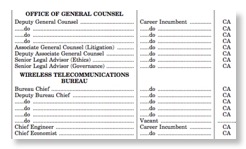
But then consider the following tweet from Chairman's Office official Gigi Sohn:
Applause for @mattdelnero as he leaves @fcc after a terrific tenure as Wireline Bureau Chief. pic.twitter.com/9pkwcNHsbX
— Gigi Sohn (@GigiBSohnFCC) December 15, 2016
A little further down in the Plum Book we see that Mr. DelNero is a "career incumbent" who is leaving FCC a little less than 3 years after joining it from Covington & Burling. What is going on?

While there are some that may be critical of everything the current FCC leadership has done, this involves a practice that has been going on for decades at FCC under BOTH parties.
The commissioners, their advisors, the senior managers in the Office of Media relations, and the chief of the Public Safety and Homeland Security Bureau are now political appointees and usually have been so in the past. The position of general counsel has nominally alternated back and forth between career and political over the years. My old boss at OET, Ed Thomas, chose to be chief of that office as a political appointee although he certainly was qualified for a career appointment due to his management and technical experience. Ed thought it would give him more prestige in dealing with political appointees at other agencies.
But most of the other bureau/office chiefs and some of their deputies are de facto political appointees who have been masquerading as career appointees and will leave in droves in the next few weeks. This masquerading has several "advantages" to the individuals involved:
- It gets around limits on the number of political appointees at FCC and allows the Chairman to stack senior managers with people who have unambiguous loyalty to him
- Career senior officials have to be vetted by OPM and committees of actual career civil servants for both job related skills and management experience. Some younger lawyers from private practice may not qualify under such standards
- Only career senior officials are eligible for special SES "performance awards"/bonuses of 5-20% of their normal salary, so having a career appointment has financial benefits
But this decades old bipartisan procedure has real downsides also.
- It discourages the development of an effective tier of top career civil servants who are politically neutral and act in the interests of the agency with loyalty to the current leadership. You say this is impossible? Consider Bob Pepper the chief of the former Office of Plans and Policy who held senior policy jobs and was a trusted advisor to chairman of both parties. OET Chief Julius Knapp has only served in that position under the current administration but has been widely viewed as politically neural during his long tenure as deputy in OET. It is hard to have such a career path at FCC now and as a result sometimes career civil servants are not as objective as they should be. Some may tell political people what they want to hear and some may secretly drag their feet on policies they disagree with. Both are inappropriate behavior for career civil servants and the fear of this is why political appointees want a thorough house cleaning.
- This system keeps much of the SES bonus pools away from real career civil servants where Congress directed it to go, further discouraging them.
- It results in large flux of senior managers with FCC chairman transitions. This is not just when the party in the White House changes. I recall a massive "career incumbent" shakeup when Chmn. Fowler left and was replace by Chmn. Sikes near the end of the Reagan Administration. This large group of senior changes decreases FCC productivity and effectiveness.
When my wife worked at NRC she reported no influx of political appointees masquerading as career civil servants into senior manage positions. NRC has a career civil service management structure that is loyal to the institution. More of this at FCC would probably help FCC effectiveness and allow the new leadership to have on hand a loyal and effective team to advise them and implement the desired policies.
Such a change cannot be implemented immediately because the current career civil servants have been affected by past practices, but I hope the next Commission will recognize the the large level of politicization of senior managers at FCC is really counterproductive. Once this problem is recognized it can start considering options for a slow and deliberate change in senior staffing and building up the skills of career civil servants to make FCC more effective.
Older Plum Books for comparison
2008
2012
UPDATE
Is it obvious to others why the bureau chief who deals with public safety should be a political appointee? It has been since this bureau was created so both parties have been behaving the same way. But does it really make sense?
.@FCC Public Safety Bureau Chief David Simpson says he will leave agency Jan. 20, same day as @TomWheelerFCC
— Howard Buskirk (@hbuskirk) December 21, 2016
Wright Case Highlights FCC's Petition Black Hole
The above snapshot of the FCC's home page today shows FCC crowing about its success in the Wright Petition case dealing with inmate call rates. While this Title II proceeding has little to do with spectrum policy it highlights the little known details about how the FCC's "petition black hole" works. The right to petition the federal government is one guaranteed by the 1st Amendment and the APA (5 U.S.C. 553(e)). FCC has implemented this requirement with 47 C.F.R. 1.401. But all this means nothing if petitions fall into an administrative black hole where they can not be seen, let alone acted on!

"These cases raise issues that are of great human concern to inmates, their family members and their counsel. . . . In referring this matter to the FCC, the Court expects the agency to move with dispatch to conclude its ongoing proceedings so as to provide both courts and parties with meaningful analysis and guidance on these issues." (Emphasis added.)
So this case was not a random petition that just wandered into the FCCs inbox, it came with the urging of a federal judge to "move with dispatch" and even then FCC frittered away years on inaction!
Petitions from techies for new spectrum rules or even waivers also can be caught in the FCC's petition back hole for years. The NPRM in Docket 13-111 on contraband cellphone use in prison accidentally gave a clue about the petition blackhole at FCC. The drafters of this NPRM had the award issue of how to deal with several petitions relating to it that had been gathering dust for years without even a request for public comments.
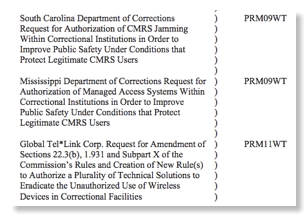
The drafters dealt with this awkward issue by identifying the petitioners with their index numbers in ECFS using a scheme that had never been revealed to the public and was not even widely known within FCC. So if you input into ECFS "PRM14WT" you get back a list of all petitions that were assigned to the Wireless Telecom Bureau, correctly or not, in 2014. There you will find that a petition from key industry player Land Mobile Communications Council was filed on 05/15/2014 and public comments were requested on 07/21/2014 as RM-11722 . But petitions from the more obscure Mark Friedlander and Cord Davidson remain in the FCC's black hole, nether having been dismissed nor having been put out for public comment.
So here is a concrete suggestion to address the root cause of the Wright Petition delay and delays of petitions lingering in the black hole: FCC should establish an online database of all petitions for rulemaking and waivers within a few weeks of their filing at FCC that identifies which bureau they have been assigned to (something that is sometimes in error) as well as stating what the current status of the petition is, e.g. without any action, dismissed, public notice requesting comments has been issued, NPRM issued, etc. FCC should also public statistics on time to resolve such petitions. So while today's commissioners decree the delay of the Wright Petition, let's make sure that never happened again in either technical or nontechnical proceedings at FCC.
ICYMI: @FCC takes a big step to reduce inmate calling rates. Details: https://t.co/4o2A10i58P
— The FCC (@FCC) October 27, 2015Amtrak, PTC, and the Need for a Credible IG at FCC

"According to Amtrak, PTC was installed in the section of track where the Philly accident occurred," a committee source writes in an email to U.S. News. "There have been delays in 'turning it on' associated with FCC dealings and getting the bandwidth to upgrade the radios from 900 MHz to something higher (for more reliability)." - US News, 5/14/15
“We continue to be actively involved in helping freight and commuter trains such as Amtrak acquire spectrum. In fact, the FCC approved Amtrak’s application for spectrum for the Washington D.C. to New York corridor after an expedited review and just two days after Amtrak submitted a final amendment to the agency in March 2015. Rail safety is a top FCC priority. Be assured that the FCC will continue to work closely with the nation’s railroads to enable the rapid deployment of Positive Train Control” - FCC/WTB Chief Roger Sherman
In the wake of this week’s fatal Amtrak train crash in Philadelphia there is a brewing controversy about FCC’s role as indicated by the above items. We have no inside information on this topic and have no opinion about whether FCC has been perfectly correct in this area or whether it may have contributed to the problem by inattention.
The issue of the need for a credible inspector general at FCC has been a recurring theme here since 2009. The FCC Inspector General Office has existed, as required by law, since 1989. But until the appointment of the current IG, all the previous IGs had been long term FCC employees who were known to be friendly to the Chairman’s Office and would not “shake the boat”. The current IG came to the IG office in 2006 after working elsewhere in FCC for 10 years before replacing his predecessor who left under a cloud.
While the FCC IG is not appointed by the President and confirmed by the Senate like cabinet agency IGs, his legal responsibilities are exactly the same - particularly with respect to the duties of § 4(a). Yet the FCC IGs over the years have kept themselves busy avoiding comments on 8th Floor actions or the overall effectiveness of FCC programs or even their compliance with the law, e.g. the Commission’ 30 history of ignoring the requirements of § 7 of the Communications Act.
Now it has been reported that the FCC IG is investigating the net neutrality decision. Perhaps, he might investigate the Amtrak PTC matter. But given the FCC IG’s indifference over the past 25 years to the overall operation of FCC and focus on only Universal Service Fund fraud and petty malfeasance of junior FCC staffers, will any FCC IG finding of agency innocence on either net neutrality or the PTC case be credible?
Isn’t it time to demand that the FCC IG be credible on all matters under his jurisdiction and not focus entirely on Universal Service Fund issues and actions of junior FCC employees?
Meanwhile, we know NTSB is investigating the crash and there certainly is a possibility that its report may fault FCC if that is where the facts lead. NTSB is less political than FCC and the House and Senate committees that FCC deals with, so its views might be a breath of fresh air.
Observations on FCC FY16 Budget
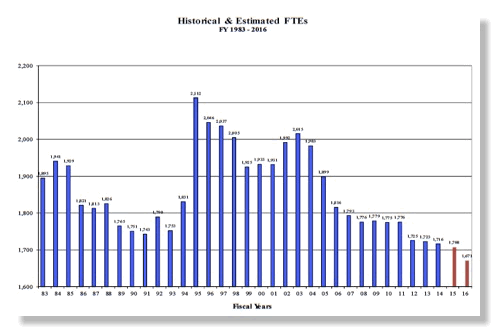
This week the President released the proposed FY2016 Budget of the US and most agencies simultaneously released their proposed budget - actually their original proposal as modified by OMB in a multi month off the record process in parallel with all other agencies’ budgets. (FCC may be an “independent agency” in many respects, but in budget matters it is treated as a member of the Executive Branch.) As usual, FCC posted it in an obscure place on its website without public announcement. However, a few days later for the first time in the history of the FCC website it showed up in the rotating headlines in the upper left corner of the FCC’s homepage. Here is a link to the FCC’s FY16 Budget Proposal to Congress.
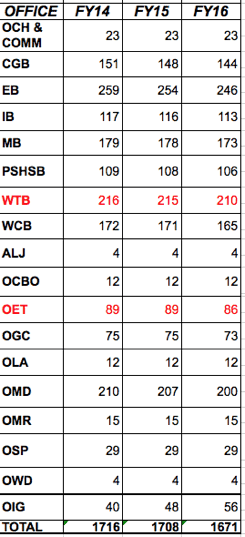
Note also that that the WTB/OET team is actually a profit center for the US Government as the recent auction results show. Yet both are drifting down in size. Some might say attrition. So while FCC faces real backlogs with dealing with new technology issues such as millimeter waves that threaten US technical leadership and also with resolving interference issues that need policy decisions that threaten the operation of incumbent licensees, the staff working on these issues will actually decrease.
What is increasing? As can be seen in the next to last line of the table, the FCC’s Inspector General’s staff is increasing from 40 to 48 to 56! The justification fro this is to fight Universal Service Fund fraud. When AT&T was a monolithic near monopolist it was agreed between them , FCC, and Congress that they would transfer money around within AT&T to subsidize rural local telephone rates with income from long distance calls. This worked well until divestiture in 1984. USF was the replacement mechanism for the old money flows internal to the old AT&T. Billions of dollars flow through the USF from our phone bills and fraud is inevitable as FCC seeks to encourage new technology with the program. So there is nothing wrong with increasing attention to such fraud and it is actually cost-effective for the tatx payer to reduce the fraud.
But, as we have pointed out previously and repeatedly, despite the good and important work OIG does on USF fraud, that is not the whole job of that office under the terms of the Inspector General Act. Until the current IG, all the previous ones were cronies of the Chairman and long term FCC staffers. They did not want to find unpleasant things that would reflect poorly on their patron. Even though the current IG is unlike his predecessor in background, he seems to follow the office tradition he inherited of not asking questions about how well FCC is run. Other agency IGs do and their statutory charter is exactly the same. So if the FCC IG gets 56 FTE in FY16 will he break with the past and use some of this for the matters he and his predecessors have been carefully avoiding in the past?
Field of Dreams & Spectrum Policy
This week, the 80th anniversary of the Communications Act of 1934, is also the 25th anniversary of “Field of Dreams”, the movie most remembered for the line “If you build it … they will come”. While I recall that President Bush (41) publicly said he was confused about the movie, President Bush (43) actually was a great fan.
The connection to spectrum policy? Classic FCC spectrum policy (along with spectrum policy in other places) was prescriptive - that is users could do A and B, but not C if C was not explicitly allowed. Thus when I joined FCC in 1979, land mobile (Part 90) users were allowed AM and FM modulation and it took a long series of rule makings, some of which inconsistent in their final technical details details, to allow digital modulation for all users. By contrast, today’s rules are generally (broadcasting and public safety being major exceptions) proscriptive in that they tell you what you may not do - generally things that would result in interference to other users.
The reason why the 1981-85 rulemaking that brought forth Wi-Fi, Bluetooth, ZigBee and many other less known products was so controversial that it resulted in an attempt to fire your blogger after the rules were adopted was that it was an earlier action to move away from this prescriptive model. The rules adopted in Docket 81-413, now updated and codified as 15.247, did not say “let there be Wi-Fi”, they said “here is this spectrum, here are rules that prevent harm to anyone else, feel free to innovate and offer new products to the public and let’s see where this goes! “ (In truth, in 1985 wired/Ethernet LANs were nonexistent in offices and homes and there are no interest in any type of wireless LAN as a product for serial production. But the flexibility grand in the Docket 81-413 R&O meant that when interest developed for RLANs within a few years those interested did not have to come to FCC and grovel for permission for years. Thus they had timely market access and history was made!)
So as we near the 1 year anniversary of the IEEE-USA petition for FCC on the spectrum above 95 GHz that now lacks any rules (and is hence implicitly forbidden for normal licensed or unlicensed use) today let us ponder what we gain by having no such rules or even a defined path to such rules. In the Docket 81-413 rulemaking most commenters were opposed saying the technology under discussion was “blue sky” and had no demand. Yet within 2 years commercial products were available. A few years later came Wi-Fi and Bluetooth -- now “applications that have changed our world”.
Let us ponder of the lessons of “If you build it … they will come” and also the spectrum policy variant: “If you allow it .. they may well build it”. Let’s see if we can convert most FCC spectrum rules from prescriptive to proscriptive structure. (The cellular rules generally have this approach already.)
ABC US News | ABC Celebrity News
ECFS & "Serial Filers"/Process Abusers
This confirmation verifies that ECFS has received and accepted your filing. However, your filing will be rejected by ECFS if it contains macros, passwords, redlining, read-only formatting, a virus, or automated links to other documents.Filings are generally processed and made available for online viewing within one business day of receipt.
While this process may check for viruses and macros, it apparently does not check for process abusers.
Take the case of one “Mr. P” who has filed 6,757 comments at FCC since 2006! He has filed 157 comments, generally “STATEMENT FOR THE RECORD “ in Docket 09-157 alone! In the case of this docket it appears that all the comments filed have no relation to the NOI in question. Their presence in the docket file only complicates access for legitimate comment filers and practitioners.
A 2013 filing of 13 documents on one day by Mr. P. - all appear unrelated to the NOI in question
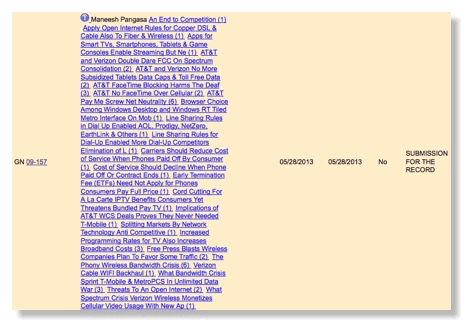
From his Twitter page we understand that he has “an interest in journalism often writes for http://Examiner.com”. Readers outside the DC area may not be familiar with a this website, but the Examiner was a daily free right wing newspaper in Washington from 2005 to mid-2013 that seemed to focus mainly on the evils of Obamacare. It is now a monthly free publication distributed at vending machines downtown that has moderated slightly in its right wing tone. He is also a sometimes blogger although he has not posted anything in almost a year, apparently viewing ECFS now as his publication platform of choice.
In 2012 FCC dismissed several filing of his dealing reassignment by AT&T of a 700 MHz spectrum license “for lack of party-in-interest standing”. However, this does not apply to comments in “informal rule makings”.
In 2012, Multichannel News’ John Eggerton (better known as the Washington bureau chief of Broadcasting & Cable) wrote “FCC Filing: Pangasa’s Sincerest Form of Flattery?”
“
Serial FCC filer Mr. P., who has flooded the commission with hundreds of comments in numerous dockets was at it again last week, filing a dozen new comments at press time opposing the sale of cable spectrum to Verizon Wireless.The comments included one that struck a little too close to home.”
Eggerton then pointed out that one of the filings was plagiarized without attribution from an article he had written for that publication. Another was lifted from comments by another group without attribution.
When will FCC limit such abusive filings? On March 20, 2014 Mr. P. submitted filings in 15 dockets.
If FCC does not want to limit such filings, perhaps it could modify the ECFS search system to make it easy to exclude results from such serial filings just as it allows on to exclude “brief comments”?
Brief comment exclusion option in ECFS
(Perhaps certain trade associations think your blogger is also an “abusive filer”?
For the record, Marcus Spectrum Solutions LLC has submitted 50 ECFS filings since 2006.)
UPDATE
Dane Ericksen, a prominent broadcast consultant and former FCC staffer, sent me a message about this post including a 2012 e-mail he had sent to FCC on the same subject that never received a response!
Here it is (ECFS screenshots not included):
From: Dane Ericksen <________@h-e.com>
Date: August 27, 2012 2:13:37 PM PDT
To: Julius Genachowski
Cc: Kris Monteith
Subject: ECFS modification
August 27, 2012
Dear Chairman Genachowski:
I am writing to urge the FCC to take action in response to Electronic Comment Filing System (ECFS) "spam," which occurs when numerous, repetitive, and often extraneous comments are filed in the ECFS. Perhaps the FCC can modify the ECFS to allow a user to ignore comments by a particular filer when conducting a search for comments. Although the ECFS currently allows one to filter out "brief comments," that filter doesn't work when a submission is filed as a regular, or non-brief, comment.
ECFS spam makes it difficult to pick out the comments that are legitimate. For example, there is one individual, a Mr. P., who has already filed over five thousand (5,000!) ECFS comments in 2012 (see the first attached screen capture PDF file). Mr. Pangasa seems to be targeting a number of rulemakings, including my area of immediate interest, ET Docket 10-142 (MSS Flexibility), which is littered with non-pertinent or vaguely pertinent submissions by Mr. P.; see the attached second screen capture PDF file.
The ability to search the ECFS, while excluding filings by up to, say, three named filers (or even just one), would be most helpful to solving the ECFS spam problem. I hope that the FCC will be able to implement this refinement to the ECFS, which has proven to be an otherwise excellent resource.
Respectfully,
Dane E. Ericksen, P.E., CSRTE, 8-VSB, CBNT
Co-Chair, Engineers for the Integrity of Broadcast Auxiliary Services Spectrum (EIBASS)
SBE Certification Committee (1987-present)
Secretary, SBE Chapter 40, San Francisco (2000-present)
c/o Hammett & Edison, Inc.
Consulting Engineers
San Francisco, CA
707/996-5200 voice
707/996-5280 fax
http://www.eibass.org/
http://h-e.com/
cc: Ms. Kris Monteith, Acting CGB Bureau Chief
UPDATE 2
On 9/25/14 your blogger got an e-mail from the individual identified above as a “serial abuser”. The following is the bulk of the message:
I found an article mentioning my name when I searched for myself in Google (on the front page) talking about comment spam on FCC website. I admit I have submitted too many comments to the FCC in the past. Sometimes when one is really passionate about something it's hard to forget not to get carried away and I spammed the proceedings. I have always found spam repugnant in email, txt, etc and I agree that it is wrong.
I pledge to stop spamming the ECFS section. I would like in return to ask if you can please remove my name from your article about ECFS Serial Abusers. I am trying to clean up my Google ranking and should not be penalized for past mistakes.
I would either like my name removed or for this page not show up in the first page of results for my name. I am sorry if my actions offended anyone. I agree that the ECFS system can and should be improved. I think the FCC should in fact have a disclaimer on the site about spam issues and advise not to file too many comments at one time. I never found any anti spam policy on the site.
In view of his promise to stop abusive filing, we have changed every mention of his name in the post to “Mr. P.” If he reforms and never abuses again the deletion will remain. But, if his abuse returns we will put his full name back in the post.
We hope his message is sincere and he has learned a lesson.
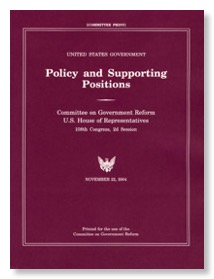
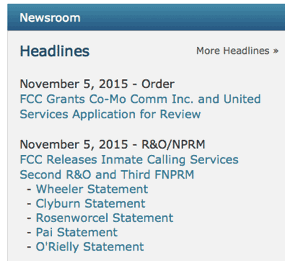
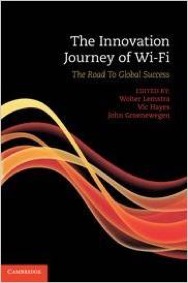



![Validate my RSS feed [Valid RSS]](valid-rss-rogers.png)

